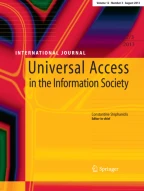Abstract
Learning Objects (LO) are elements that due to their nature present special difficulties at the evaluation, since they have both the characteristics of a software application and an instructional element; the above is complicated by the inclusion of the disability issue, because there are factors that must be considered in a special way. The present work exposes the creation and application of an instrument to determine the learning objects quality for people with visual impairment integrating a services approach (ILOBlind). The types of visual impairment considered in the research are blindness and visual weakness. This new way of addressing the problem of LOs quality is expected to be more affective, because it considers in a broader way the user's opinion. Another problem is that the LOs evaluation is usually done by an expert in the area, leaving aside the opinion of the user. With the integration of the service theory, we seek to employ user satisfaction to determine the LO quality. This work presents the process of developing the ILOBLind instrument. The results obtained from its application in a Multiple Care Center in Mexico are exposed and the instrument generated is presented in its entirety. The application of the ILOBind instrument reported high rates of use satisfaction, obtaining values of "Fully satisfied" among users.
Similar content being viewed by others
References
Aguilar, J., Zechinelli, J., Muñoz, J.: Hacia la creación y administración de repositorios de objetos de aprendizaje. IV Congreso Internacional de Ciencias de la Computación, ENC 2003 (2003)
Nesbit, J., Belfer, K., Leacock, T.: Learning Object Review Instrument (LORI). User Manual. E-Learning Research and Assessment Network (2003)
Velázquez, C., Muñoz, J., Álvarez, F., Pinales, F., Garza, L.: Estrategias de Gestión de la Calidad en el Desarrollo de Objetos de Aprendizaje. Tercera Conferencia Latinoamericana de Tecnologías de Objetos de Aprendizaje LACLO 2008, Aguascalientes, Aguascalientes, México, pp. 185–190 (2008)
Spohrer, J., Maglio, P., Bayley, J., Gruhl, D.: Steps Toward a Science of Service Systems, pp. 71–77. IEEE Computer Society (2007)
Parasuraman, A., Zeithaml, V., Berry, L.: A conceptual model of service quality and its implication. J. Mark. 49, 41–50 (1985)
Chen, L. Lin, C.: Integrating Kano’s model into E-learning satisfaction. In: 2007 IEEE International Conference on Industrial Engineering and Engineering Management, pp. 297–301 (2007)
Parasuraman, A., Berry, L., Zeithaml, V.: SERVQUAL: a multiple-item scale for measuring consumer perceptions of service quality. J. Retail. 64(1), 12–40 (1988)
SEP: Discapacidad visual: Guía didáctica para la inclusión en educación inicial y básica (2010)
WHO, World Health Organization Page: https://www.who.int/blindness/en/ (2019). Accessed 12 June 2019
WHO, World Health Organization Page: https://www.who.int/en/news-room/fact-sheets/detail/blindness-and-visual-impairment (2018). 11 October 2018. Accessed 12 June 2019
Velázquez, C., Muñoz, J., Álvarez, F., Garza, L.: La Determinación de la Calidad de Objetos de Aprendizaje. Avances en la ciencia de la computación. VII Encuentro Internacional de Ciencias de la Computación ENC 2006, San Luis Potosí, México, pp. 346–351 (2006)
Velázquez, C., Muñoz, J., Álvarez, F., Cardona, J. Torres, D., Ortega, A.: Development of an instrument for the determination of learning objects quality for students with visual impairment integrating the services theory. In: 2019 International Conference on Inclusive Technologies and Education (CONTIE), San Jose del Cabo, Mexico, pp. 45–454 (2019). https://doi.org/10.1109/CONTIE49246.2019.00018
Shahin, A.: SERVQUAL and model of service quality gaps: a framework for determining and prioritizing critical factors in delivering quality services. In: 4th International Conference on Quality Management, Tehran, 19–21 December 2004
Velázquez, C., Álvarez, F., Garza, L., Muñoz, J. Cardona, J. Hernández, Y., Silva, A.: Comparación de Tres Estrategias para la Gestión de la Calidad en Objetos de Aprendizaje. Séptima Conferencia Latinoamericana de Objetos de Aprendizaje LACLO 2012, Guayaquil, Ecuador (2012)
Velázquez, C., Álvarez, F., Garza, L., Muñoz, J., Cardona, J.: Modelo Conceptual Inicial para Determinar la Calidad en Objetos de Aprendizaje Integrando un Enfoque a Servicios. DIFU100@ 7(2), 41–45 (2013)
Portal de educación.com.mx: Guía completa de centros educativos en México. https://portaldeeducacion.com.mx/educacion-especial-cam/index.htm (2019). Accessed 12 June 2019
Acknowledgements
Thanks are due to the Autonomous University of Aguascalientes authorities for financing the research project. We would like to thank to the authorities and students of CAM No. 5 of Aguascalientes City, México, for their confidence and time to carry out the experimentation.
On behalf of all authors, the corresponding author states that there is no conflict of interest.
Author information
Authors and Affiliations
Corresponding author
Additional information
Publisher's Note
Springer Nature remains neutral with regard to jurisdictional claims in published maps and institutional affiliations.
Rights and permissions
About this article
Cite this article
Amador, C.E.V., Arteaga, J.M., Rodríguez, F.J.Á. et al. An instrument for the determination of learning objects quality for students with visual impairment integrating the services theory (ILOBlind). Univ Access Inf Soc 22, 1175–1183 (2023). https://doi.org/10.1007/s10209-022-00890-y
Accepted:
Published:
Issue Date:
DOI: https://doi.org/10.1007/s10209-022-00890-y
